Team Experience is revisiting nine Judy Garland pictures for her Centennial. Here's Nathaniel R on a troubled moment in time...
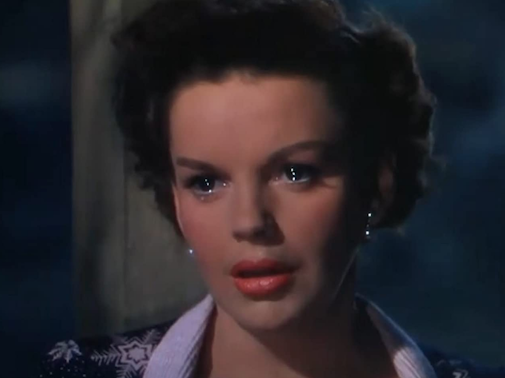
Judy Garland's enduring legend comes not just from her rightful title as "The World's Greatest Entertainer" but for her troubled offscreen life. It's not that sadness, addictions, tragedy, and/or an early demise should fascinate the public more than the work itself but the fact is that they often do (see also Clift, Monroe, Ledger, Dean, Leigh, and many other stars throughout history). Judy's struggles only make her incredibly transcendent work in concert halls and movie screens more jaw-dropping; you rarely see anything other than megawatt talent and professional magic. That isn't quite the case with Summer Stock (1950) which makes it an anomaly in her filmography. It's a rare curious glimpse at Garland in-and-out of her magic, like a flickering but gorgeous light. For a time it even threatened to be her final picture...
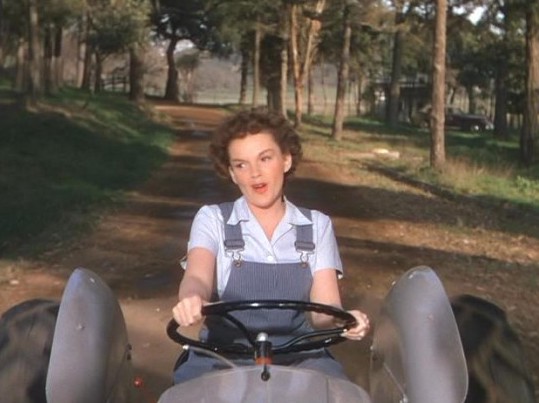 Summer Stock, Or, If Dorothy Had Stayed in Kansas and Took Over the Farm.
Summer Stock, Or, If Dorothy Had Stayed in Kansas and Took Over the Farm.
In the final big screen pairing of Gene Kelly and Judy Garland (after For Me and My Gal and The Pirate) still-rising Kelly plays a smooth-talking travelling actor that orphaned hometown girl Judy gets mixed up with and swept off her feet by. That's exactly the skeleton of their relationship in The Pirate though the films could hardly be more different. The latter is a hallucinatory fantasy but this one is matter-of-fact and grounded. Judy is a romantic dreamer seeking danger and excitement in The Pirate but in Summer Stock, she's a stubborn small town woman who likes working the farm she inherited from her parents. In other words, this girl plans to stay in Kansas no matter how much Oz you throw at her.
Enter Gene Kelly as her flighty sister's New York City boyfriend who comes to town to stage a musical in Judy's giant empty barn. He's hoping to drum up interest from Broadway producers. At first Judy is having none of it and repeatedly threatens to throw Kelly and his troupe out. She's too busy worrying about her spoiled sister (Gloria de Haven), her farm debts, and her boyish bumbling fiancee (Eddie Bracken) who she obviously doesn't love.
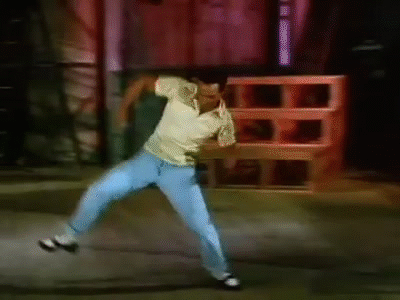 a tiny glimpse of Summer Stock's second best number -- a solo dance for Kelly
a tiny glimpse of Summer Stock's second best number -- a solo dance for Kelly
You can see where Summer Stock is going from a country mile away but it's still good swoony fun to get there especially with Gene Kelly in his prime as the chief temptation.
Charles Walter, who directed Garland with great success in Easter Parade, was behind the camera again. The musical performance numbers are well shot (apart from two odd cuts - was there a problem with footage?) and sometimes soar. "Dig Dig Dig for Your Dinner," a energetic faux spiritual number with Kelly dancing on table tops, a staid squaredance that suddenly sparks in "Portland Fancy", and a romantic duet between the stars "You Wonderful You" which is later reprised in an inventive solo dance for Kelly, are all thrilling. That's largely thanks to Gene Kelly's choreography, the cinematography by the Oscar-winning Harry Stradling Sr (who was just about to shoot A Streetcar Named Desire), and of course the estimable gifts of Kelly and Garland both as dancers and singers. Walter makes several wise choices behind the camera, the best of them being a continuous shot during Judy's ballad "Friendly Star" that drifts away from Judy to Gene Kelly listening, rapt, and back to Judy as she finishes the song and notices Kelly as unintended audience. All in all the highs of the picture make this an underrated title in her filmography.
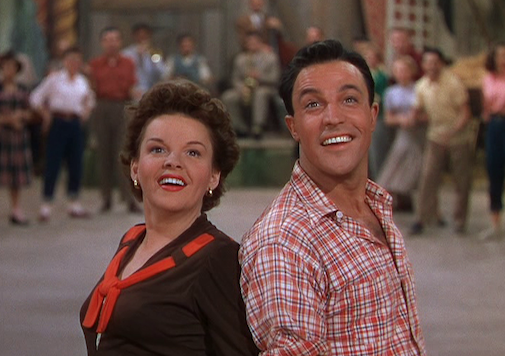 If only there were more than three Garland & Kelly pictures!
If only there were more than three Garland & Kelly pictures!
Still, despite some euphoric moments, you can see Garland struggling in a way she hadn't previously. Her eyes feel more manic as if she's pushing for emotional emphasis -- usually it's so organic -- and she isn't always "on" in the dialogue scenes. Her weight fluctuates from scene to scene, too. That wouldn't be quite so noticeable (she can still dance up a storm) if not for the iconic "Get Happy" number which was shot two months after the rest of the scenes after Garland took a break and lost twenty pounds. "Get Happy" is trademark Garland magic, every gesture has an electric spark, every lyric is emotionally alive, and every beat carries musical joy.
The film was released at the end of August 1950 but by that time she'd already been fired from her follow-up film Royal Wedding (1951) and MGM terminated her contract shortly after Summer Stock opened. The studio where she'd spent her whole career had had enough. Thankfully for Garland fans the world over and Garland fans of the future, this wasn't the end of her spectacular career. You have to go away to have a comeback, after all, and a grand one was in store a few years down the road.
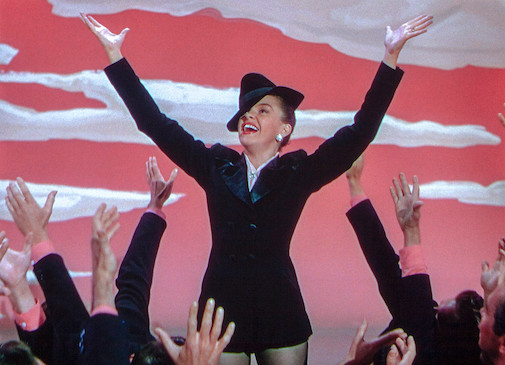 "Get Happy" - easy to do with this showstopper
"Get Happy" - easy to do with this showstopper
P.S. Here's a fun bit of trivia to close out this episode of Judy @100. "Get Happy" was inspired by a cut number from Easter Parade (1948) called "Mr Monotony" which you can see in full here. Different song but same costume and similar moves.
More for Judy's Centennial here at The Film Experience
• The Wizard of Oz (1939)
• Babes on Broadway (1942)
• Meet Me in St Louis (1944)
• The Clock (1945)
• The Pirate (1948)
• Easter Parade (1948)
Tomorrow: A Star is Born (1954)